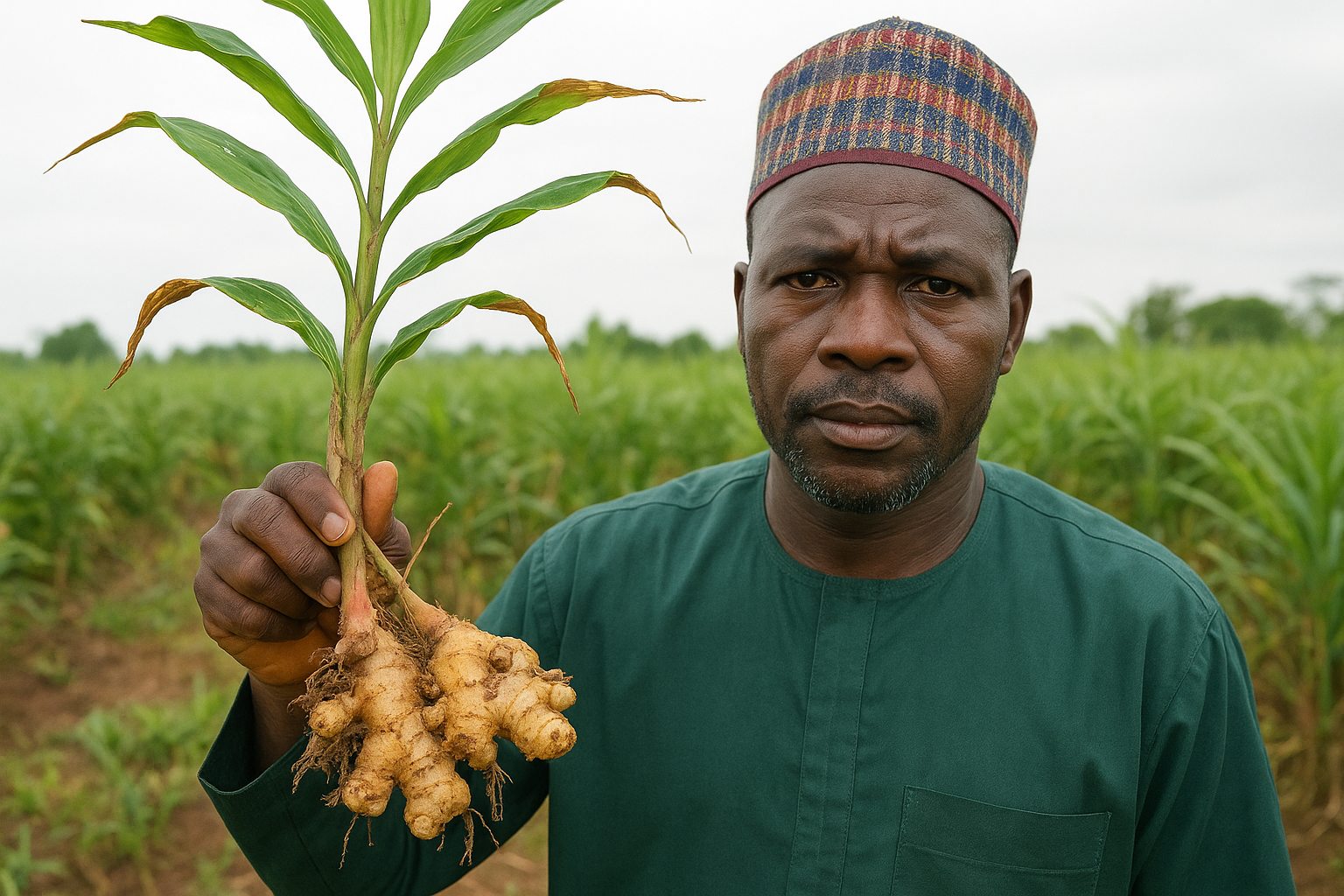
How International Grants and GMO Inputs Crippled Nigeria’s Ginger Industry: The Untold Story of a Collapse
Lagos, Nigeria – November 14, 2025
In 2017, Nigeria held a proud position on the global agricultural map: the world’s third-largest exporter of ginger, behind only India and China.
International buyers, from spice processors to pharmaceutical companies, sought after Nigeria’s ginger, often praising its unique pungency, high oil content, and unmatched quality.
Ironically, India and China, Nigeria’s biggest competitors, regularly bought Nigerian ginger, mixed it with their own produce, and re-exported it under their national labels.
Nigeria had the world’s gold-standard ginger.
Until everything fell apart.
According to Segun Adebayo, Deputy Director at the Center for Food Safety and Agricultural Research (CEFSAR), the collapse did not come from natural disaster, domestic mismanagement, or climate anomaly. It came from what was packaged and presented as help.
When Help Arrived Disguised as Opportunity
Sometime around 2017/2018, an American development agency, USAID, approached a Nigerian organization, Tac Integrated, with an enticing proposition: “Let’s improve Nigeria’s ginger value chain. Let’s upgrade your processes. Let’s add value, and improve Nigeria’s ginger value chain, so you are not exporting raw produce.”
“It sounded visionary. It sounded progressive.” As Adebayo admits, many people in the agricultural sector would have agreed, it was perfectly aligned with the national call for value addition.
Tac Integrated accepted the partnership. Farm inputs, support packages, and intervention materials soon followed. They were labeled grants and assistance. No alarms were raised.
But by 2022, tragedy had begun to unfold.
The Blight That Broke an Industry
After the introduction of the foreign farm inputs, allegedly improved seeds, soil enhancers, and synthetic boosters, farmers began reporting strange developments:
- ginger tubers rotting from inside,
- crops developing black fungal patches,
- widespread blight spreading faster than anything they had previously seen.
What was once Nigeria’s “pride crop” suddenly became a nightmare on farmlands.
Buyers rejected Nigerian ginger in international markets. Quality tests failed. Shipments were turned back.
By 2023–2024, ginger farms in Kaduna, Nigeria’s major production hub, had been devastated. Entire communities were wiped out economically.
Farmers Lost Everything – Some Lost Their Lives
The scale of loss went far beyond export numbers.
Adebayo narrates that many farmers had taken loans because the program promised expansion, higher yields, and better market access.
When the blight hit, farms died, debts piled up, hope disappeared.
“Several farmers, unable to cope with the financial and emotional pressure, committed suicide. Others simply abandoned Kaduna, fleeing southwards in search of menial jobs to survive.”
Entire ginger cooperatives dissolved. Clusters of farmlands were abandoned, left to weeds and dust.
2025: The Unthinkable Happens
In a twist that would have been unimaginable a decade earlier, Nigeria, once a global ginger powerhouse, became an importer of ginger in 2025.
The situation is so dire that genuine Nigerian ginger has become a black-market commodity. Adebayo describes a grim reality:
“It is like buying a banned substance. You must know a guy who knows a guy who knows a guy before you can get Nigerian ginger.”
The country that once fed the world now struggles to feed its domestic demand.
How a Blessing Became a Curse
The story of Nigeria’s ginger illustrates a painful truth: Not all foreign “assistance” is assistance.
Agricultural interventions that come packaged as grants, improved seeds, and international partnerships often slip into the dangerous territory of:
- introducing untested inputs,
- creating dependency,
- damaging local biodiversity,
- destabilizing value chains,
- and eventually eliminating local competition to make room for imports.
The Nigerian ginger industry walked straight into this trap. What was presented as a golden opportunity became the very tool that crippled what was once a global success story.
A Call for Agricultural Sovereignty
The collapse of Nigeria’s ginger industry raises difficult but necessary questions such as:
- Why were foreign farm inputs not thoroughly tested before nationwide deployment?
- Who monitored the GMO-linked materials that entered our agricultural space?
- Why are international grants accepted without biosafety audits?
- How many other crops are at risk of similar collapse?
This tragedy should force policymakers, researchers, and agricultural leaders to reconsider Nigeria’s vulnerability to external agricultural interventions.
Conclusion: A Nation Must Protect What It Owns
The destruction of Nigeria’s ginger industry is more than an economic setback, it is a national warning.
Segun Adebayo puts it bluntly:
“These things that come in the form of blessings don’t always end up being the blessings they are meant to be.”
Agricultural independence is not optional. Food sovereignty is not negotiable. Nigeria must relearn how to protect its crops, its farmers, if it wants to survive. Before another industry follows ginger into collapse.